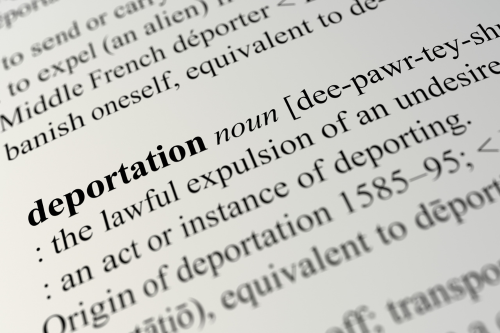Voluntary deportation, or self-deportation, is when immigrants choose to leave the United States on their own. This has become more common in recent years, especially after former President Trump’s threats to make immigration rules stricter.
Some immigrants have temporary legal status, but many are afraid of being forced to leave. Trump’s promises to deport more people made many decide to leave the country before that could happen.
In this blog, you can learn more about voluntary deportation and how Trump’s immigration policies played a part in this growing trend.
Why Do Many Immigrants Choose Voluntary Deportation in the United States?
Immigrants affected by Trump's policies often feel more at risk. Trump's threats, like talk of “Trump illegals” and mass raids, have created fear for many people. This fear of being caught and deported makes some choose to leave the U.S. on their own. But what does deported mean?
It means being forced to leave a country, usually sent back to where you came from. For some, waiting for that to happen is too stressful and costly. Immigrants who choose voluntary deportation often feel like they have no other choice.
These include people with temporary permits, refugees, and those seeking asylum in the United States. Programs like Humanitarian Parole and Temporary Protected Status are meant to help immigrants. However, uncertainty about these programs makes many feel that leaving voluntarily is their only choice.
A common question is, “Will immigrants be deported in the U.S.?” While the government focuses mostly on undocumented immigrants, even those with temporary status feel the weight of Trump's immigration policies. For some, voluntary deportation feels like the only way to stay in control of their situation.
The Cost of Voluntary Deportation: What Do Immigrants Lose?
Voluntary deportation means leaving a country where many immigrants have built their lives. But it’s not an easy decision. For immigrants affected by Trump’s policies, going back to their home countries can be very expensive, both emotionally and financially.
When immigrants choose to self-deport, they might lose jobs that helped them take care of their families. This means losing their financial stability. It’s also emotionally tough. After living in the U.S. for so long, going back to a country that feels unfamiliar can be hard.
Self-deportation isn’t just about leaving a place. It also means giving up rights, opportunities, and a sense of belonging. Immigrants who make this choice have to make big sacrifices in many parts of their lives.
Fear-Based Policies
During Trump's previous presidency, the administration’s hardline stance on immigration relied heavily on fear. Public comments and threats from officials caused even immigrants with legal status to question their safety.
The answer lies in the complexity of U.S. immigration law. While legal immigrants are generally protected, certain violations or changes in status could make them vulnerable to removal. By law, U.S. citizens cannot be deported.
During Trump's term, misinformation and fear campaigns made things unclear. This led some people to self-deport, even when they were not in immediate danger. Deportation involves an immigration court issuing a deportation order after determining someone’s removal is warranted.
Many people fear reaching the voluntary deportation stage. This fear often makes them leave on their own. They may have good reasons to stay in the country.

From Broken Dreams to New Beginnings: The Fate of Those Who Self-Deport
Michel Bérrios is a young man from Nicaragua. He came to the United States seeking refuge. He shares the difficult reality of being in this situation. Bérrios faced the fear of deportation. This fear made him leave the U.S. Then he became an immigrant seeking asylum in Europe.
His destination wasn’t his home country, but Ireland, a place that represents new opportunities and greater safety. And this is not a unique story. Many immigrants who choose voluntary deportation in the United States seek places to rebuild their lives. They want to escape the fear and restrictions they face in this country.
However, after seeking asylum in the United States, starting over is not easy. Immigrants face cultural, language, and economic barriers, along with the uncertainty of a new immigration system. For those with no other option, sacrifice becomes inevitable.
Can the United States Regain the Trust of Immigrants?
Voluntary deportation reflects the broader loss of trust in the United States as a haven for immigrants. Immigrants play an important role in the U.S. economy and society. However, Trump's mass deportation plan and immigration policies have made many feel unwelcome.
For the U.S. to rebuild trust, it must address the fear and uncertainty that drive immigrants to self-deport. Legal reforms, clearer communication, and stronger protections for vulnerable populations are essential.
Until then, self deportation will remain a painful reality for many. The economic impact of immigrant deportations and self departures out of the United States is estimated to be significant.
Contact Us Today to Get the Help You Deserve!
At Goldstein Immigration Lawyers in California, we understand that immigration processes can be overwhelming. We're here to guide you through the journey. If you are worried about the deportation process, the latest immigration news, or options for voluntary departure, we can help. We also provide advice about Humanitarian Parole for immigrants.
Our services are designed to ensure your immigration status is protected. Don’t wait any longer—contact us today for specialized legal advice and support. Let us guide you every step of the way!
Check Our Source Here:
Author: CHRISTOPHER SHERMAN and OLGA R. RODRIGUEZ. (January 16, 2025). Some immigrants are already leaving the US in 'self-deportations' as Trump’s threats loom. AP News.

FAQs About Voluntary Deportation and Deportation Policies
In this FAQ, we’ll break down everything you need to know about voluntary deportation, the deportation process, and the policies driving these decisions.
1. What is the most common reason for deportation?
The most common reason for deportation is violating immigration laws, such as overstaying a visa or entering the country illegally.
2. Can ICE deport you at any time?
ICE can detain and deport individuals who are in violation of immigration laws. However, those with legal status are generally protected unless they commit certain offenses.
3. How many illegals does Trump want to deport?
Trump has expressed a goal of deporting millions of undocumented immigrants. His administration’s focus on immigration enforcement has led to increased fear among immigrant communities.
4. How does deportation work?
Deportation begins with an arrest by immigration authorities. After a hearing in immigration court, a judge may give a deportation order. This happens if the person is found to be removable.
5. Can legal immigrants be deported?
Yes, legal immigrants can be deported if they violate certain laws or conditions of their status.
6. What does voluntary departure or deportation mean?
Voluntary deportation allows immigrants to leave the U.S. on their own, avoiding the formal process and consequences of deportation.
7. Where do they drop you off when you get deported?
Deportees are typically sent to the main airport in their country of origin.
8. What does deported mean?
Deported meaning the forced removal of an individual from one country to another. Usually a person is sent back to their home country.
9. Can you deport a legal citizen?
No, U.S. citizens cannot be deported. However, misinformation often causes confusion about this topic.
Posted in: Blog
